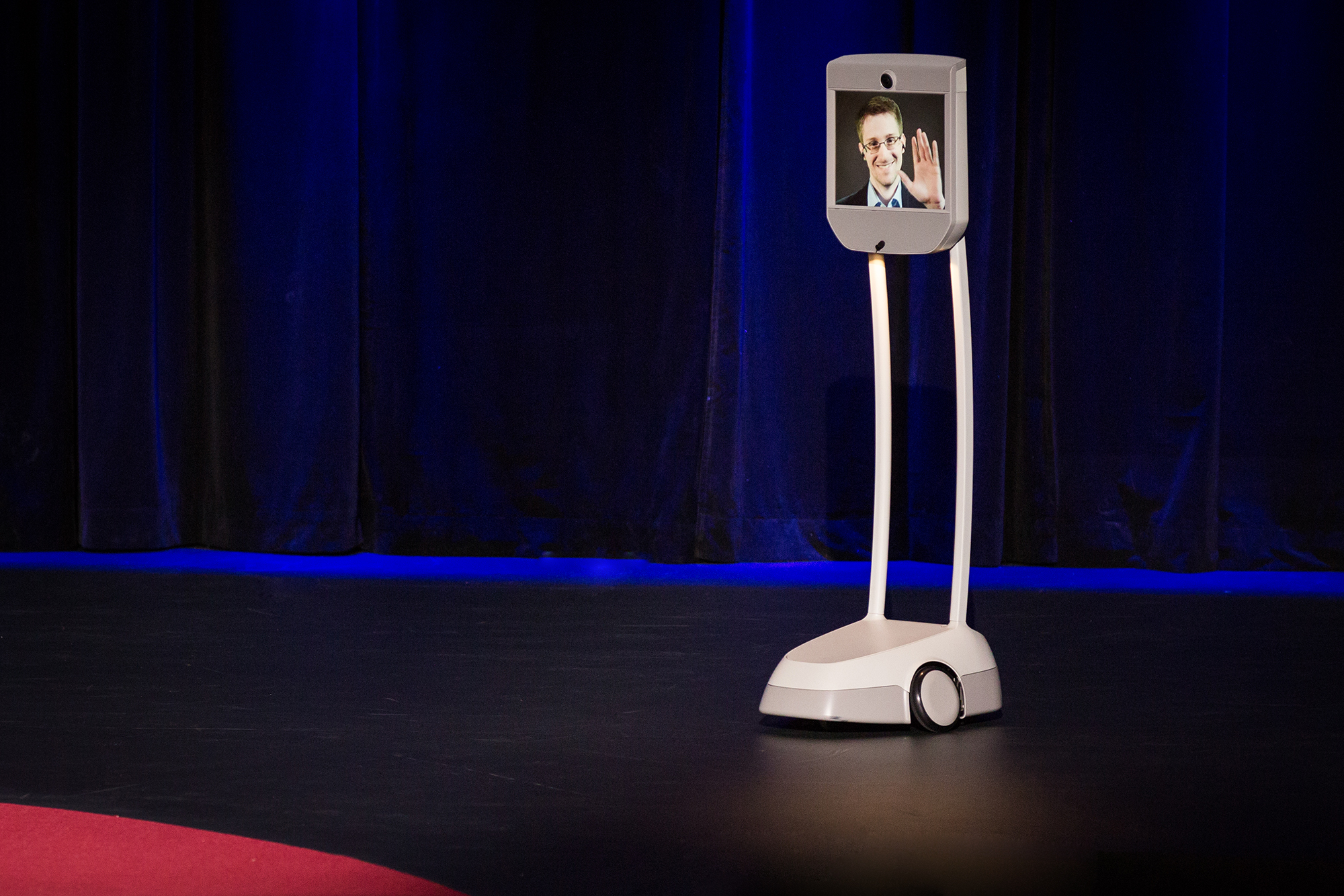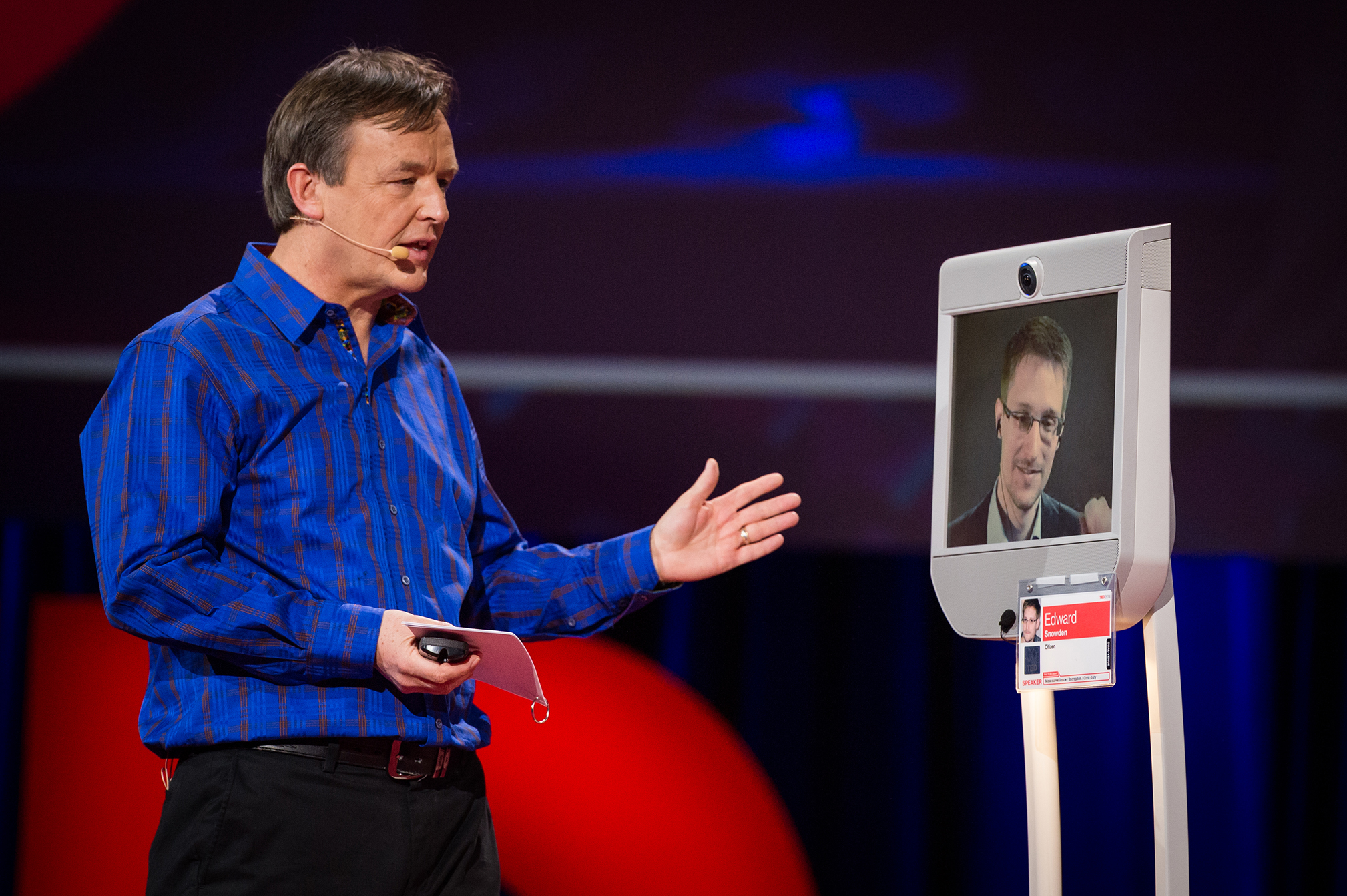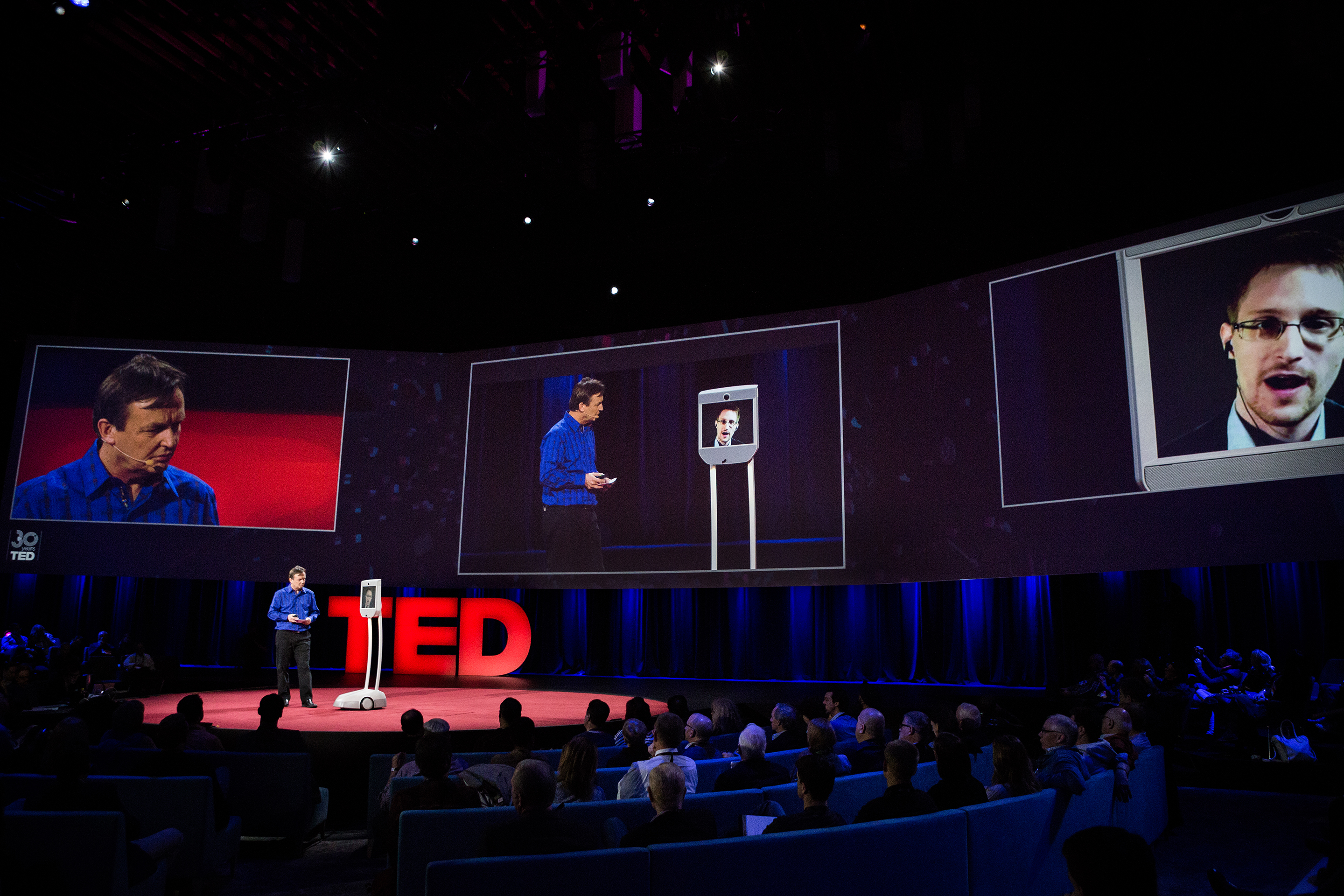So here’s a surprise. Chris Anderson takes the stage to introduce a very special guest — who’s not actually here. Beaming in from a remote location in Russia, controlling a bot he can wheel around the stage to see the assembled audience, here’s arguably the most controversial figure in contemporary culture: Edward Snowden. As he wheels slowly onto the stage, there’s a palpable gasp from the audience, silence, then slightly nervous laughter as he arrives center stage, smiles and tells us “I can see everyone. This is amazing!” Watch Edward Snowden’s TED Talk, read this edited version of his conversation with Chris Anderson — or see the interactive transcript of the talk here.
Chris Anderson: You’ve been called many things in the last few months: whistleblower, traitor, hero… What words would you use to describe yourself?
Edward Snowden: You know, everybody who’s involved with this debate has been struggling over me, my personality and how to describe me. This isn’t the question we should be struggling with. Who I am really doesn’t matter at all. If I’m the worst person in the world, hate me and move on. What really matters here are the issues of the government we want, the Internet we want, the relationship between people and societies. That’s what I hope the debate will move towards. If i had to describe myself, I’m not a hero, patriot, traitor. I’d say I’m an American and a citizen. [Applause.]
So let’s recap what happened for those who might not know. You were stationed in Hawaii, you were a security consultant to the NSA. As a sysadmin you had access to systems, and you began reviewing and passing classified documents to journalists. What propelled you to do this?
When I was sitting in Hawaii, I saw a lot of things that disturbed me. But first of all, we do a lot of good things in the intelligence community, things that need to be done, that help everyone. But things go too far, decisions are being made in secret without the public’s awareness or consent, without representatives in government having knowledge of programs. When I really came to struggle with these issues, I thought, “How can I do this in the most responsible way, to maximize the public benefit and minimize the risks?” I could have gone to Congress, where there were no legal protections for private employees or a contractor, and a risk that I would be buried along with the information and the public would never find out. The 1st Amendment of the US Constitution guarantees a free press for a reason, to guarantee an adversarial press, to challenge the government and work with the government. I thought to have a dialog and debate about matters that are of vital importance — without putting national security at risk — by giving all my information back to the American people rather than trusting myself to make the right decisions about publication, and that we’d have deep debate, for the benefit for everyone. The risks that have been threatened, the risks that have been played up by the government have never materialized. There has been no evidence of a specific instance of harm so I’m comfortable with the decisions I made.
Tell the audience what the Prism program really meant.
First, what Prism isn’t. The debate in the US is about metadata. That this is “just metadata.” They’re talking about the specific section 215 of the Patriot Act; this is warrantless wiretapping, phone-tapping, who you’re talking to, when you’re talking to them, where you travel — those are all metadata events. Prism is about content. It’s a program through which the government could compel corporate America, deputize corporate America to do the dirty work for the NSA. Even though some companies did resist — I think Yahoo did challenge this in court — they lost. But this was never tried by open court, only by secret court. This has been a talking point in the US government, that 15 federal judges reviewed the programs and found them to be lawful. What they don’t tell you is those are secret judges in a secret court making secret interpretations of the law. There have been 34,000 warrant requests in 33 years and they only rejected 11 government requests. These aren’t the people we want deciding what the role of corporate America in a free society should be.
The slide we’re looking at shows dates when companies joined the Prism program. They’ve denied collaborating with the NSA, so how was that data collected?
The NSA’s own slides refer to it as direct access. What that means to an NSA analyst, someone like me, who’s targeting Chinese cyber acts, is that the provenance of data is directly from their servers. It doesn’t mean that there’s a group of company reps sitting in a smoky room, palling around with the NSA and making backroom deals to give stuff away. Some [companies] are responsible, some are less responsible. When we talk about this information and how it’s given, it’s given by the companies themselves, it’s not stolen. Even though companies push back and say, “Hey, let’s do this through a warrant process, we have some legal review and basis for handing over users’ data,” we saw stories in the Washington Post that said the NSA broke into the data center communications between Google to itself, Yahoo to itself. Even when those companies cooperate in a lawful manner with the NSA, the NSA isn’t satisfied. We need our companies to work very hard to guarantee they’re going to represent the interest of the user and advocate for the rights of the users. We’ve seen the companies named on the slides take great strides to do that and I encourage that to continue.
The biggest thing an Internet company in America can do today without consulting lawyers to protect users worldwide is to enable SSL web encryption on every page you visit. The reason this matters is that today, if you look at the book 1984 on amazon.com, the NSA can see a record of that, the Russian intelligence service can see a record of that, the French, the German… It’s unencrypted. The world’s library, amazon.com, not only does not support encryption by default but you cannot choose encryption. I don’t mean to single out Amazon; all companies should move to encrypted browsing by default. That will increase the privacy and rights that people enjoy worldwide. [Applause]
What’s Boundless Informant?
All credit to the NSA for using appropriate names. Boundless Informant is a program the NSA hid from Congress. The NSA was previously asked by Congress to give a rough ballpark estimate of the amount of American communications being intercepted. They said they don’t track those stats: “we can’t track those stats, we can’t tell you how many communications we’re intercepting. To tell you that would be to invade privacy.” [He laughs, so does the audience, though somewhat wryly.] But the capability already exists, it’s already in place. The NSA has its own data format that tracks both ends of a communication. Boundless Informant tells us that more communications are being intercepted in America about Americans than there are in Russia about Russians. I’m not sure that’s what an intelligence agency should be aiming for.
There was another story, that the NSA broke privacy rules thousands of times a year. What was that about?
We heard in Congressional testimony, and this was amazing for someone like me from the NSA who’s seen the internal documents and knows what in them, to see officials testify under oath that there were no abuses, no violations of rules. We knew this story was coming. One event out of 2,776 affected more than 3,000 people. In another event, they intercepted all the calls in Washington DC — by accident. What’s amazing about this report is not only were there 2,776 abuses but the chairman of the Senate’s Intelligence Committee, Dianne Feinstein, had not even seen the report until the Washington Post contacted her asking for comment. She then requested a copy from the NSA. What does that say about the state of oversight in the Senate when the chairman of the Intelligence Committee has no idea about thousands of abuses?
You might think if you haven’t done anything wrong then it doesn’t really matter. Why should we care about all this surveillance?
The first thing is you’re giving up your rights. “I don’t think I’m going to need them so I’ll get rid of them, it doesn’t really matter, these guys will do the right thing.” But your rights matter because you never know when you’ll need them. In democratic societies around the world, people should be able to pick up the phone, call family, send text messages to loved one, travel by train, buy an airline ticket — without wondering how those events will look to an agent of government, possibly not even your government but one years in the future. How might this be misinterpreted? We have a right to privacy. We require warrants to be based on probable causes. Trusting any government authority with the entirety of human communications without any oversight is too great a temptation to be ignored.
Some people are furious with you. Dick Cheney, for instance, described Julian Assange as a fleabite, and said you are the lion that bit the head off the dog. He thinks you’ve committed one of worst acts of betrayal in human history.
[smiles] Dick Cheney is really something else. [The audience laughs, and applauds.] Thank you.
At the time Julian Assange was doing his greatest work, Dick Cheney was saying he’d endangered governments worldwide, the skies were going to ignite, seas would boil off. Now he says it was a fleabite. We should be suspicious of overblown claims from these officials. But! Let’s assume that these people really believe this. I would argue they have a narrow conception of national security. The prerogatives of people like Dick Cheney do not keep the nation safe; the public interest is not always the same as the national interest. The Internet is not the enemy, the economy is not the enemy.
It’s been alleged you stole 1.7 million documents. So far, hundreds have been shared. Is there more to come?
There are absolutely more revelations to come. Some of the most important reporting is yet to come.
There was another story about the campaign to crack and undermine internet security. Can you explain Bullrun?
Again, we’ve got to thank the NSA for their candor. This is a program named after a civil war battle. It targets our own infrastructure. It’s a program thorough which the NSA intentionally misleads corporate partners, saying these are safe standards and we need to work with you to secure the system. In reality, it’s bad advice to companies that degrades the quality of service. They’re building in backdoors that not only can the NSA exploit, but so can anyone else with time and resources. They’re letting themselves into the world’s communications and this is really dangerous. If we lose a single standard, if we lose the trust of SSL, we will live in a less safe world overall. We won’t be able to access banks or commerce without worrying about people monitoring our communications.
So this means we’re open to cyberattack from other sources too?
Absolutely. The NSA has traditionally worn two hats; it’s been in charge of offensive operations and defensive operations. Usually, it prioritizes defense over offense; American secrets are worth more. If we hack Chinese business and steal its secrets, or those in Berlin, that’s of less value to the American people than making sure that the Chinese can’t get access to our secrets. In reducing the security of our own communications, they’re putting us at risk in a fundamental way.
Someone is making the calculation that it’s worth doing this, as a part of defense against terrorism. Is this a price worth paying?
When you look at the results of these programs countering terrorism, you see that’s unfounded. You don’t have to take my word for it. We had the first open court to review this outside secrecy arrangement. It was called Orwellian and likely unconstitutional. Congress has asked to be briefed and has produced bills to reform it. Two independent White House panels said the programs had never stopped a single imminent terrorism attack in the US. Is it really terrorism we’re stopping? Do these programs have any value at all? I say no. All three branches say no as well.
Do you think there’s a deeper motivation for them other than war against terrorism?
The bottom line is that terrorism is used as a cover for action. Terrorism provokes an emotional response that allows people to rationalize and authorize programs they wouldn’t have otherwise. The US asked for this authority in the 1990s; it asked the FBI to make the case in Congress, and they said no, it’s not worth the risk to the economy, it would do too much damage to society to justify gains. But in the post 9/11 era, they used secrecy and justification of terrorism to start programs in secret without asking Congress or the American people. Government behind closed doors is what we must guard against.
Most people would find your situation terrifying. We see the treatment of Bradley, now Chelsea Manning. Some people in the intelligence community are said to want you dead. How are you copying with this fear?
It’s no mystery that there are governments that want to see me dead. I’ve been clear again and again and again, I go to sleep thinking about what I can do for the American people. I don’t want to harm my government, I want to help them. But the fact that they are willing to completely ignore due process, they are willing to declare guilt without ever seeing a trial, these are things we need to work against as a society. This is not appropriate.
So who in the audience thinks Edward has committed a dangerous act? [Some hands go up.] It’s hard to put your hand up when the man is here.
I can see you! [Laughs]
And who thinks he’s working towards long term good? [More hands go up.] What’s interesting is this debate doesn’t seem to split along traditional political lines, left, right, libertarian… Part of it is a generational issue; you’re part of the generation that grew up with the Internet. It’s like you’ve become offended at a visceral level when you see something that will harm it. Is there any truth to that?
This is not a left/right issue. Our basic freedoms — and by “our,” I don’t just mean Americans, but people around world — are not a partisan issue. These are things all people believe and it’s up to all of us to protect it. For people who’ve seen the open internet, it’s up to us to preserve that for the next generation to enjoy. If we don’t change things, if we don’t stand up to make the changes we need to do to make the Internet safe for us and everyone, we’ll lose that. That would be a tremendous loss for us and for the world.
So the founder of the web has been calling for a Magna Carta for the Internet. In fact, he’s here. Tim Berners-Lee, will you come up on stage? First of all, Tim, which camp are you in?
Tim Berners-Lee: I’ve given much longer answers to that question, but in short, a hero.
And Edward, what do you make of the idea of a Magna Carta for the Internet?
I grew up not just thinking about the Internet, I grew up in the Internet. Although I never expected to have the chance to defend it in such a direct and practical manner, or to embody it in this unusual, avatar manner, there’s something poetic about it. A Magna Carta for the Internet is exactly what we need to encode values not just in writing but in the structure of the Internet. I hope to invite everyone in the audience, not just in Vancouver, to join and participate.
TBL: So the web is 25 years old this month, and we’re trying to get people who don’t normally think about it, but who use the web from day do day to think about these questions. So Edward, a question for you: what would you think would be the best we can achieve from all the discussions we can have about the web we want?
When we think about it in terms of how far we can go, that question is limited by what we’re willing to put in. The Internet we enjoyed in the past has been what we as a nation and people around the world need.
TED began 30 years ago, in 1984. But it seems Orwell got it wrong, his was almost an optimistic view?
There is an argument to be made that the powers of Big Brother have increased enormously. A legal article at Yale established the Bankston and Soltani principle. But there is still hope. The power of individuals has also been increased by technology. Individuals can go head to head against the most powerful adversaries and agencies in the world — and win. That’s something we need to take hope from and build on to make accessible to everyone. Journalism is not a crime… Communication is not a crime.
The New York Times is calling for an amnesty for you. Would you welcome the chance to come back?
Absolutely. There’s really no question. The principles that have been the foundation of this project have been the public interest and the principles that underlie the journalistic establishment in the US and around the world. I think if the press is now saying we support this, this is something that needed to happen, that’s a powerful argument but it’s not final. That’s something the public should decide. The government has hinted they want some kind of deal, a compromise deal to come back. But I want to make it very clear. I did not do this to be safe. I did this to do what was right. I won’t stop working in the public interest just to benefit myself. [Applause.]
So TED’s mission is “ideas worth spreading.” What’s your idea worth spreading?
I would say the last year has been a reminder that democracy may die behind closed doors. We don’t have to give up privacy to have good government, we don’t have to give up liberty to have security. By working together we can have open government and private lives. I look forward to working with everyone to see that happen.
I don’t know how you shake the hand of a bot, but, well, thanks.
[Extended standing ovation.]




Comments (21)